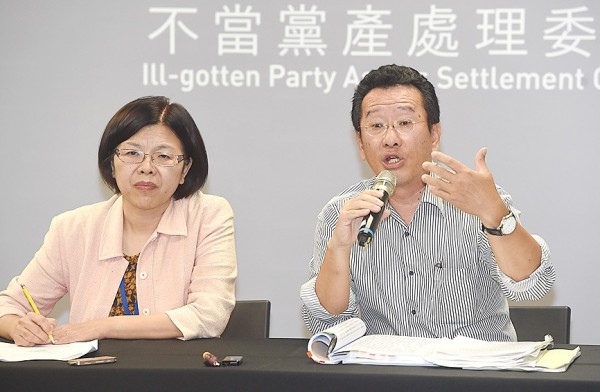《TAIPEI TIMES 焦點》 Central Investment, Hsinyutai are KMT assets: Koo

Ill-gotten Party Assets Settlement Committee chairman Wellington Koo, right, and committee spokeswoman Shih Chin-fang yesterday hold a news conference in Taipei to identify Central Investment Co and Hsinyutai Co as Chinese Nationalist Party (KMT) affiliated institutions. Photo: Liao Chen-huei, Taipei Times
By Chen Wei-han / Staff reporter
The Ill-gotten Party Assets Settlement Committee yesterday identified Central Investment Co (中央投資公司) and its spinoff, Hsinyutai Co (欣裕台股份有限公司), as organizations affiliated with the Chinese Nationalist Party (KMT), and prohibited the two companies from disposing of their assets.
The two companies, which have a combined value of NT$15.6 billion (US$494.17 million) have been recognized as KMT-affiliated organizations because they are 100 percent owned by the KMT, which has control over their management, committee chairman Wellington Koo (顧立雄) said.
The KMT has been the sole shareholder in Central Investment and Hsinyutai since their inceptions in 1971 and 2010 respectively. The party placed all its shares in Central Investment in trust in 2007, but the shares were transferred back to the KMT in September, the committee said.
An order prohibiting the disposal of the companies’ assets has been issued. The companies can appeal the order with the Taipei High Administrative Court within two months, Koo said.
However, the firms can file a property disposal plan with the committee to pay their employees’ salaries, mortgage and debt payments if the payments are necessary to maintain the firms’ financial stability.
Koo had questioned the source of the KMT’s income after the party’s announcement on Sunday that it had raised the paid-in capital for Central Investment — NT$200 million in government bonds — using legal income.
Party membership fees, which the KMT said it used to fund Central Investment, only made up 3 to 4 percent of the KMT’s income in the 1950s, when the party derived 50 to 70 percent of its income from government subsidies, Koo said.
Although government subsidies are a legal source of income for a political party, Koo questioned whether the KMT had abused its power during its authoritarian rule to secure the subsidies.
“Under the party-state system, government subsidies accounted for the majority of the KMT’s income. The KMT’s claim that it raised the paid-in capital of Central Investment with legal income is therefore questionable,” Koo said.
The committee has not ruled out interviewing former KMT treasurers Liu Tai-ying (劉泰英) and Hsu Li-teh (徐立德) to clarify the issues amid the KMT’s repeated requests that the committee interview former KMT financial officials to better understand the funding of Central Investment.
However, Liu and Hsu held the position after 1971 and KMT officials who were in charge at that time have passed away, Koo said.
“It remains and will likely remain unknown who purchased the NT$200 million in government bonds and how the funds were sourced,” he said.
The committee has yet to decide if the assets of the two companies should be transferred to the government pending interviews with former KMT officials, while the committee also plans to study documents at the KMT History Institute.
The KMT yesterday said it would file administrative litigation in accordance with the law.
新聞來源:TAIPEI TIMES

















